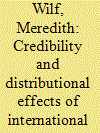| Srl | Item |
| 1 |
ID:
149130


|
|
|
|
|
| Summary/Abstract |
Financial regulatory networks are a pervasive new type of global governance heralded by some as a flexible answer to globalization dilemmas and dismissed by others as ineffective because of weak enforcement mechanisms. Whether regulatory network agreements provide global public goods or private goods for certain states’ firms is a second debated issue. This article adjudicates among competing perspectives by examining whether Basel III, an international agreement about bank capital minimums negotiated by the bank regulatory network in 2009 and 2010, was viewed as credible and affecting regulated US firms. I use stock returns to measure investors’ perceptions, and an event study methodology to test whether regulated banks’ observed stock returns significantly differ from expected stock returns on days when new information about Basel III becomes available. If the agreement is viewed as credible and affecting firm value, banks’ stock returns will deviate from expectations. The direction of any deviation indicates whether regulations benefit or hurt banks. Although the direction of effects is not uniform across events, I find that the initial stock return reaction and the net effect across all five events are negative, and of a similar magnitude as regulated foreign banks, indicating that US banks were harmed, and did not benefit from, the new international regulations. US banks experienced stock returns that differed from expectations, providing evidence that international regulatory network agreements are viewed as credible and tangibly affect firms independent of domestic implementation.
|
|
|
|
|
|
|
|
|
|
|
|
|
|
|
|
| 2 |
ID:
167878


|
|
|
|
|
| Summary/Abstract |
What arguments affect citizen support for policies? Most existing studies of preferences emphasize direct effects on personal welfare. Yet, for many regulatory policies—like financial regulations—recent theories highlight indirect policy externalities, such as interdependent foreign policies and/or global economic networks. We theorize that citizens will respond to arguments emphasizing the three distinct theoretical logics—direct, interdependent, and network. We further hypothesize that their beliefs about the international system and about out-group members might explain heterogeneity in citizen responses. An original survey experiment compares support for financial regulations when respondents receive different arguments about the policy's positive effects. Respondents most strongly supported regulations when provided with the network logic. Even among respondents least likely to support financial regulations (e.g., conservatives), the network argument systematically increased support. Interdependence arguments did not significantly increase support. We find some evidence of moderation by respondents’ beliefs about the international system but little evidence of moderation by beliefs about out-group members. Overall, we find strong, consistent effects of network arguments and conclude that citizens respond to indirect arguments. Our results suggest that interdependent and networked perspectives toward the structure of the global economy represent a promising avenue to further understand public support for economic policies.
|
|
|
|
|
|
|
|
|
|
|
|
|
|
|
|